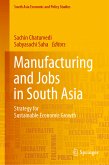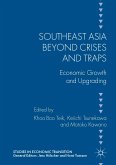This book sheds new light on the advancement of various industries in developing Asian countries through an application and re-examination of catch-up industrialization theory. With contributors presenting their own perspectives on the progression of a range of different industries in Asia, this volume provokes readers to reconsider their current understanding of industrialization in latecomer countries. More specifically, the chapters discuss Taiwan's semiconductor industry, Korea's steel industry, and Malaysia's palm oil industry, amongst others. The authors also explore the 'catch-down' innovation strategy in China and India. Varieties and Alternatives of Catching-up provides a thorough analysis of the strategies employed by numerous Asian countries to radically transform their low-income agricultural economies to middle-income industrialized ones. This book is essential reading for researchers and scholars interested in Asian economic development.
Dieser Download kann aus rechtlichen Gründen nur mit Rechnungsadresse in A, B, BG, CY, CZ, D, DK, EW, E, FIN, F, GR, HR, H, IRL, I, LT, L, LR, M, NL, PL, P, R, S, SLO, SK ausgeliefert werden.









